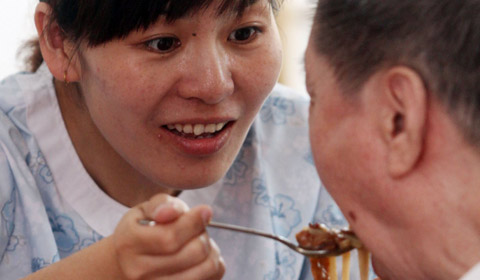Easing up on English
Updated: 2013-10-24 07:33
By Peng Yining, He Na and Wang Shanshan in Beijing (China Daily)
|
||||||||
World's second language to play smaller role in national college entrance exams, report Peng Yining, He Na and Wang Shanshan in Beijing.
Yin Zixuan, an 18-year-old high school student in Beijing, started learning English as a child in kindergarten.
"We've always been told that the English language is important for getting into a good college, finding a good job and a lot of other things," he said. "And then, all of sudden, we're told that its role will be reduced in the most important test for Chinese students."
 |
|
Speaking English is the focus of a class in Beijing on Wednesday. Liu Chang / for China Daily |
Starting in 2016, the points for English in China's national college entrance examination, gaokao, will fall from 150 to 100, according to a draft paper released by the Beijing Education Examinations Authority on Monday, which was aimed at gauging public opinion.
Yin said the reform, if implemented, would be a big change for students and schools in Beijing.
"The school doesn't care about things that aren't related to exams, most importantly, the gaokao. Our classes are always test-oriented," he said. "I can imagine how happy those who are not very good at English would be, but I think English is important, not just for gaokao, but also for the future, to ensure better job opportunities. However, I'm applying to a college in the United States. If I succeed, I won't even have to take the national entrance exam," he said.
Preparing for change
Hu Hongyang, vice-president of Nanjing Foreign Language School, one of eight foreign-language schools built in 1963 on the orders of then Premier Zhou Enlai to nurture China's future diplomats, said the policy is a sign of things to come and schools will inevitably cut the number of hours they devote to teaching English.
"The gaokao is still like the orchestra conductor's baton in most places in China," she said. "I have heard that some county-level schools are already considering cutting back on English classes in preparation for the new policies.
"Many provinces have spoken about lowering the status of English in the college entrance exam, but no one expected Beijing to do it so quickly and to be the first place to make the decision," she added.
According to the draft paper, English tests will be conducted every six months during the three years students spend in high school, with their highest recorded score used as the final mark.
The top score attainable in the national entrance exam will remain 750 marks, with the number available for the Chinese section rising to 180 from 150. Total marks available for social and natural sciences will rise to 320 from 300.
If implemented, the changes would have huge repercussions for the private education sector, according to Kevin Peter, a US citizen who's been involved in English-language education in Beijing for six years.
"I think it's a tremendous opportunity for schools and companies that provide content and learning beyond the traditional exam areas, such as grammar, vocabulary, idioms, things like that," said Peter, who manages a privately owned school.
"From the time of its foundation, the school has never seen learning English as a goal in and of itself, but also as a means of expanding the students' worldview and helping them to become more curious and think more creatively and independently."


 Mass. teacher slain; 14-year-old student charged
Mass. teacher slain; 14-year-old student charged
 Driven by smiles
Driven by smiles
 Camp gives sporting chance for students headed overseas
Camp gives sporting chance for students headed overseas
 Chinese protest UK 'fishing' raids
Chinese protest UK 'fishing' raids
 Caretakers in need of counseling
Caretakers in need of counseling Pumpkin fun ahead of Halloween
Pumpkin fun ahead of Halloween
 Weakening Raymond soaks Mexico, no serious damage
Weakening Raymond soaks Mexico, no serious damage Apple unveils new Macs, iPad ahead of holidays
Apple unveils new Macs, iPad ahead of holidays
Most Viewed
Editor's Picks

|

|

|

|

|

|
Today's Top News
US-China trade talks a 'turning point' in relations
US press not so free, experts say
China and India sign border pact
Investment deal a work in progress
Chongqing launches visa-free stays
HK growing in popularity for foreign companies
Top officials promote new power relations
Iowa, Hebei 'sister' visit wraps up
US Weekly

|

|







